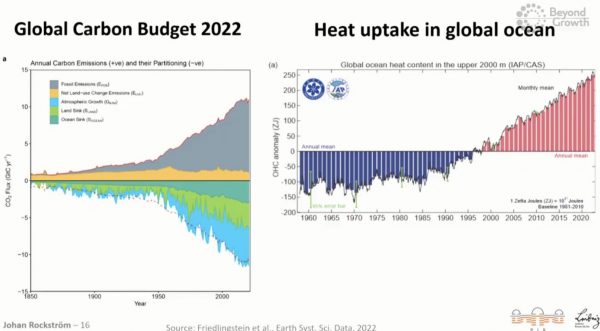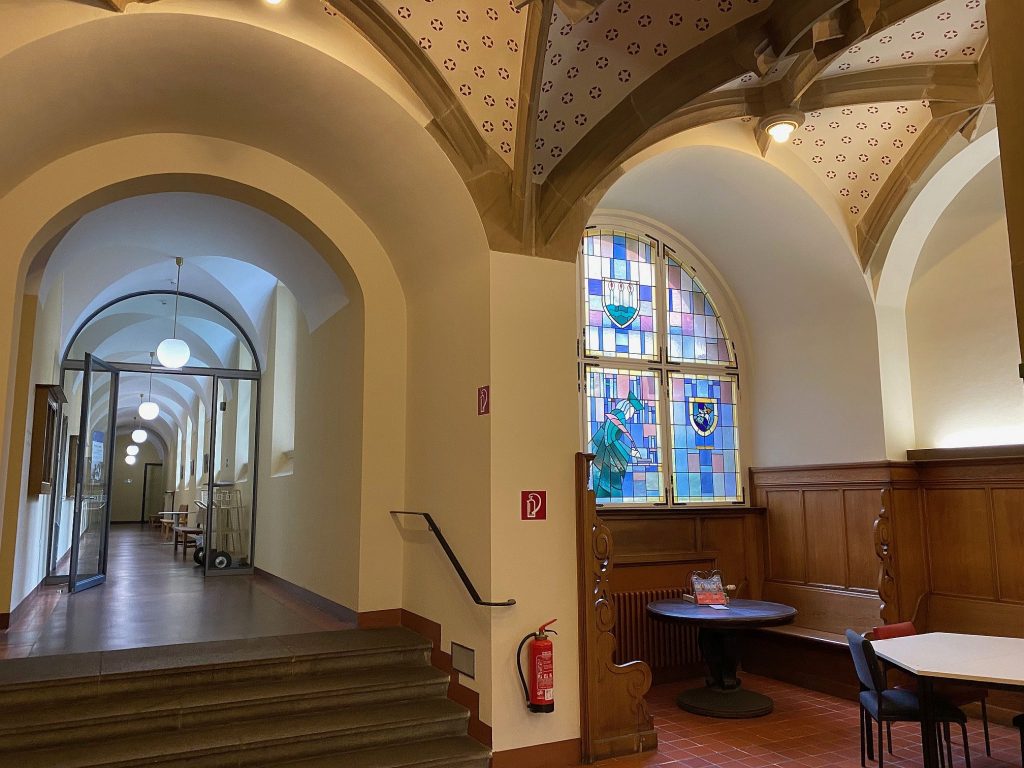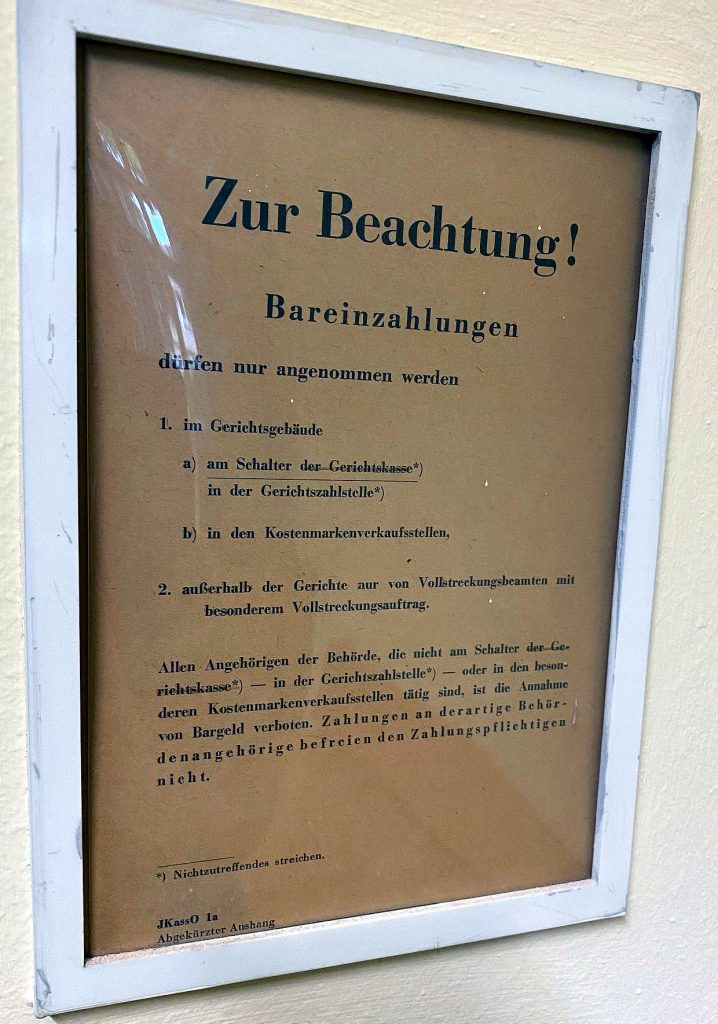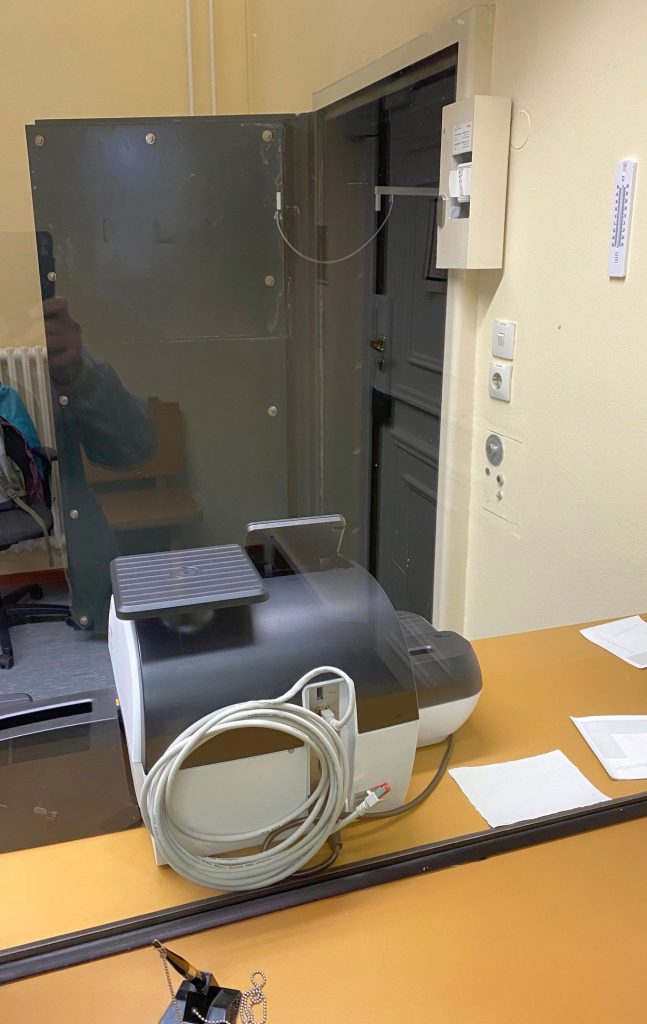Modern digital technologies turn pages for you. Just with one touch.
Search functions that are implemented in the software allow you to search for any keyword you are keen to follow-up on. These are valuable advantages of digital versions of books or other content. Once you adapt the brightness of the screen you can scroll comfortably through hundreds of pages. These books are called flipbooks and there are a number of editors specialised on these versions.
In combination with a blog format of publishing online first and then transforming content into flipbooks or even printed versions, www.MPL-publisher.com offers a nice feature to host such flipbooks. It is comfortable to know that the content has a unique address on the web, which you can share freely and use from all sorts of devices including your smartphone, tablet, desktop or notebook. The collection of my images I even watch sometimes on an even larger TV-screen or a beamer for teaching purposes.
Yes, we can (!) teach from a smartphone. Learners have opted for the small screens a long time ago. -“hey – teachers, leave us kids alone. We don’t need no education, we don’t need no thought control“. Flipbooks combine the classic form and feeling to turn a page as accomplished progress with the fast access to keywords that spread over several pages of the book.
My latest version of blog entries from 1st of January to 30th of June 2024 is at your fingertip now. (here, allow for a really long download time!). A screenshot is provided below of page 114 of a total of 390 (OMG) on a notebook screen. The search list is shown for the keyword “wage” as an example.
A shorter reader on “Society and AI” is available here as flipbook (29 pages).

Sonnendank
Jeder kennt den Sonnengruß aus dem Yoga. Jetzt gibt es eine neue Variante des Sonnengrußes. Nach vielen anderen Bundesländern hat sich Berlin an seine Mieterinnen, Pächterinnen und Eigentümerinnen gewandt, damit sie sich an der Ernte der Sonnenenergie beteiligen. Mit € 500 wurden kleine Steckersolarkraftwerke gefördert, die jede/jeder beantragen konnte der den Hauptwohnsitz in Berlin hat. Interessant war die erweiterte Interpretation des Balkons. Es wurden Kleinanlagen für Balkon, Terrasse, Gartenzaun oder auch für die Gartenlaube in die Förderung einbezogen. Alles digital zu erledigen, bitte.
Die öffentliche Förderung wird wohl die 2-3 fache Summe an privaten Investitionen anreizen. Das kann dann schon ein Anfang sein. Die Aussicht auf mehr Balkon- und Laubenpieper, die Strom für den Eigenbedarf erzeugen, kann hoffentlich mehr Personen bewegen, derartige Investitionen rasch umzusetzen. Viele Beispiele zeigen die Wirtschaftlichkeit solcher kleiner Investitionen, aber einige Jahre des Betriebs sollten schon einkalkuliert werden. Viel hängt dabei von dem allgemeinen Strompreis ab. Seit der Aggression Russlands in der Ukraine wissen wir, dass es noch viele weitere Gründe für die Beteiligung an der Energiewende gibt. Mehr Energiesouveränität fängt im Kleinen an, eine dezentrale Erzeugung und Verbrauch vor Ort kann sogar eine Netzausfall oder Notfallreserve darstellen.
Zu dem morgendlichen Sonnengruß reiht sich dann bald der tägliche Sonnendank ein. Mit dem entsprechenden Messgerät lässt sich die Sonnenernte leicht in Zahlen fassen und wir hören es buchstäblich im Geldbeutel klingeln. So werden gleichzeitig Steuergelder mit einer Hebelwirkung durch zusätzliche private Investitionen sinnvoll eingesetzt. Ein Digitalisierungsschub der privaten Antragsstellenden, Betreibende der Anlagen und öffentlichen Stellen ist ein zusätzlich sinnvolles Nebenprodukt. Papierlose Verwaltung ist ein Megaprojekt. Jetzt danken wir aber erst einmal der Sonne als großzügigem, selbstlosen Energielieferanten. (Image: IBB Webseite 2023). 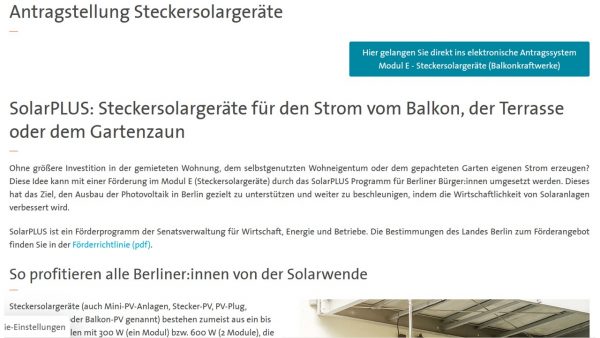
Digital Egal
In den deutschen Amtsstuben geht es Ende 2023 oft noch erschreckend analog zu. Für einen Grundbuchauszug, beispielsweise, hatte ich das außerordentliche Vergnügen das Grundbuchamt am Amtsgericht in Berlin Ringstraße aufzusuchen. Sonst nimmt man sich ja nicht die Zeit, solche Sehenswürdigkeiten von innen zu besuchen. Die Überraschungen waren vielfältiger Art. 3 Personen Wachpersonal und Metalldetektor, wie bei der Flugabfertigung. Für den Auszug aus dem Grundbuch ist selbstverständlich eine Gebühr fällig, die nur bar entrichtet werden kann. Auf zur Zahlstelle, immerhin auf dem gleichen Flur. Die nächste Amtsstube hat zwar noch einen richtig historischen Tresor, aber die Erfassung der Zahlung läuft wohl noch auf alten Geräten. Vielleicht per relativ unsicherem WLAN verbunden. Das LAN-Kabel ist jedoch schon mitgeliefert, das dann irgendwann einmal eine sicherere Netzanbindung ermöglichen wird.
Über einen Dienstleister lässt sich der Verwaltungsakt auch online erledigen unter Herausgabe der Kreditkartendaten und sonstiger Daten (Cookies) samt Unterschrift per Maus (!). Das ganze für die doppelte Verwaltungsgebühr. Dank des 49 € Tickets wollte ich mir diesen Spaß jedoch live gönnen. Wahrscheinlich werde ich das nochmals mit den Enkelkindern so als lebendigen Museumsbesuch nachvollziehen. Wer weiß, wie lange das noch möglich sein wird. Das Personal trägt es mit Fassung und dem nötigen Humor.
Bisher kannte ich die Diskussion über die Digitalisierung der Verwaltungen mehr aus wissenschaftlichen und technischen Diskursen. Jetzt kann ich so richtig in das Jammern darüber einstimmen. Produktivitätsfortschritte lassen sich hier in ungeahntem Maße erzielen. Einer geht noch: Was ist das längste Wort in dem Amtsvorgang und wie viele Buchstaben hat es?
Gerichtskassenstemplerabdruck (auf der Quittung).
Car Energy
The car industry sells more electricity-driven than diesel-cars for the first time in July 2023 (ACEA, 2023). This is a turnaround, considering the large share of the most polluting cars in the EU. It is difficult to see this as good news as newly sold diesel-cars will be around and polluting for many years to come. Hybrid cars are an own category and full of heavy additional material that allows 2 types of mobility. Tax reductions to push hybrid cars into the EU-market were very expensive for tax-payers and increasing inequality through co-financing rather expensive cars. 36,3%, the largest share, are still petrol-driven cars, with little awareness for further CO2 reductions. This is the slow evolution of the energy consumption pattern of the automotive industry in Europe.
On the energy production side there have been substantial efforts to invest in clean energy, too (IEA, 2023). With the world burning at several places already it is, after all, good news that investment in solar energy production on a global level has reached the level of investment in fossil fuels. Major drivers of this evolution are 1. China, 2. Europe and 3. The U.S. A. (unadjusted for population size) according to this investment report. Grids and storage investments rise equally to new heights, reflecting new distributional aspects of power provision within and between countries. We are in the race against the burning of our planet due to our shameless use of fossil fuels, worst in form of flying small jet planes. Besides the large company and state investments we need the spending and investment power of the masses to speed up the end of the fossil fuel age of polluting dinosaurs. Please do not replace one dinosaur (coal, oil, gas) with another one (nuclear). Too big to fail is maybe an economic rationale, but it does not withstand natural disasters (Fukushima), human failure (Tschernobyl) or war activity (Saporischschja).
(Figure source: IEA, Power investment in billion US$, 2019-2023, IEA, Paris https://www.iea.org/data-and-statistics/charts/power-investment-2019-2023.
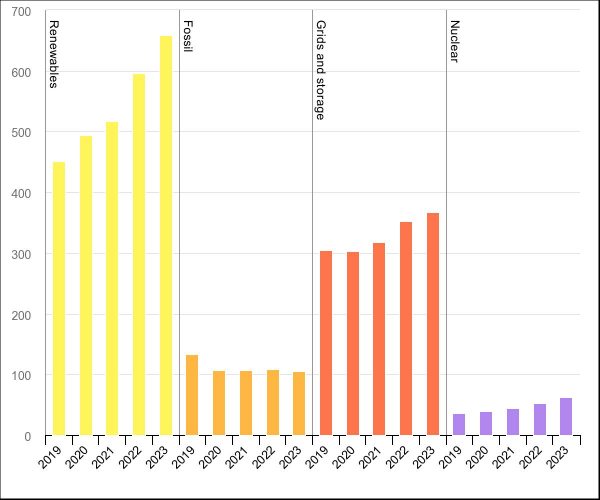
Air pollution
Only if we measure air pollution , we shall be able to be sure it is not getting worse or is improving. The European Environment Agency has developed an app that gives us fairly accurate measure of several important indicators of air pollution or air quality as they prefer to name the indicators. With the wild fires in Canada and the repercussions of this in U.S. cities we are certainly aware that air pollution by neighbours is just as important to know as air polllution originating in your own country.
In Europe this matters as well. Therefore the comparative view on air pollution is a necessary precondition to coordinate action within the EU. Specific meteological conditions yield SMOG in winter and too much heat facilitates SMOG in summer. Thousands of people die every year due to effects of air pollution. This is all well-known and documented.
In Science Advances (2023-6-9) new evidence is presented that fine particles (PM 2.5) in air transport influenza H1N1 viruses into the lower respiratory system and even other more distant organs like liver and kidneys. The conclusion is easy: Reduce air pollution much further, this saves lives and lots of costs in the health system as well. Well-being is advanced sometimes by doing less rather than more. Working more in the home office than in the inner city might reduce the peak of an influenza wave. New solutions to old problems are feasible with new technological advances and implementation like fibre-optic cables for fast internet service also in remote areas. Using the “Science Advances” should allow us to rethink our production and consumption model for the improvement of living and working conditions for all. Many extensions of our economic model shall be based on the “beyond growth” logic. We just need to dare to think and implement policies accordingly, rather than to continue to do the same mistakes over and over again. (Image: still building new Autobahn in Berlin 2022 in residential areas). 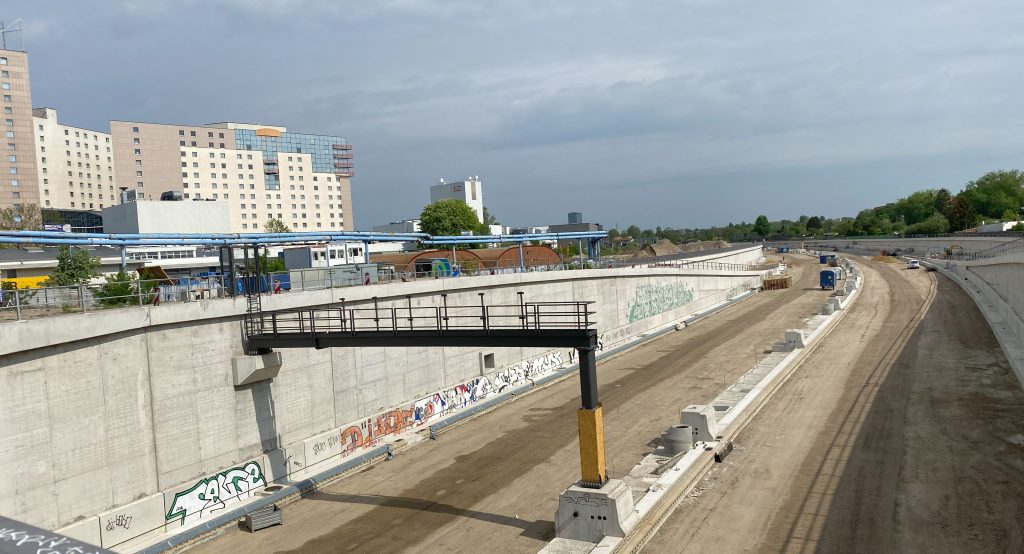
Beyond growth
We have reached the bio-physical limits to economic growth much earlier than most people and experts expected. The “Beyond growth conference” at the European Parliament 15.-17.5.2023 is quite unanimous in this verdict of collective failure. Some advocate “degrowth” in various forms. Maybe the framing of how to address the vital topic of how to set objectives for a post-growth economy needs an even broader perspective. It is a global issue, but the industrial growth societies around the globe will have to work together to find and implement solutions. The worldwide conference COP-XY are hardly delivering on the issue. At best they satisfy the ego of political leaders to address important issues providing nice images from nice places in the world (Paris agreement) to advance their own political campaigns.
From an economist’s view rather than solving a very complex issue with uncertain outcome, it is more instructive to, for example, start to produce the same economic and social well-being by using much less natural resources above all climate-toxic elements (Carbon-dioxide CO2, Chlorofluorocarbons CFC, or methane). These are simple first steps with a rather immediate effect. After the recent crises we have learned to safe resources (heating) and reduce mobility, just continuing on this trajectory is feasible. Vastly excessive forms of consumption need to be capped through targeted taxes that allow redistribution or investment in reduction of pollution. It isn’t hard to do, or “It’s easy, if you try“, we might sing. 